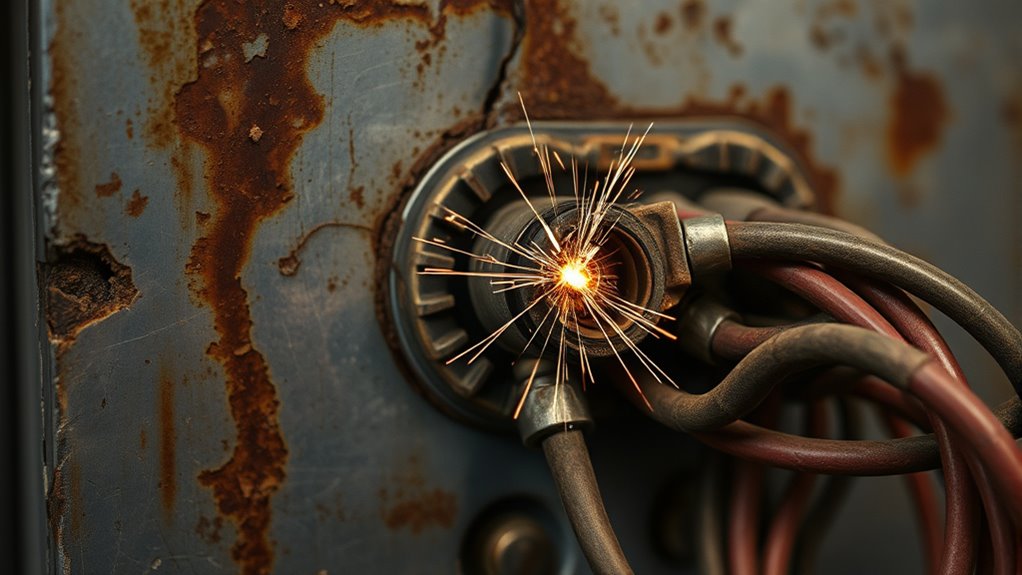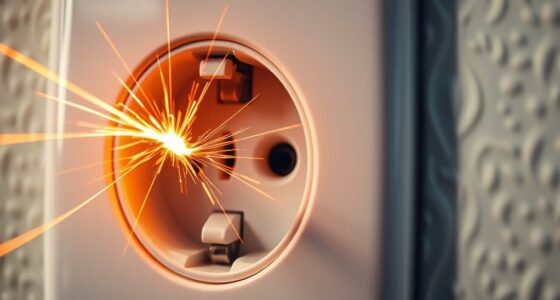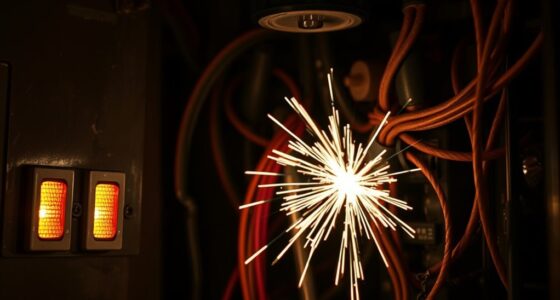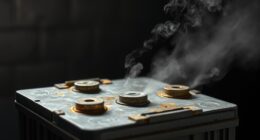A buzzing electrical panel can be a normal hum from grounding or a sign of trouble like loose connections, faulty breakers, or arcing. If the noise is loud, persistent, or worsens over time, it might indicate a dangerous loose lug or other serious issue. Ignoring it can lead to overheating, fire, or damage. To keep your system safe, learn how to identify the cause and when to call a professional for help.
Key Takeaways
- A gentle hum from the panel is normal; loud or irregular buzzing may indicate a loose or faulty connection.
- Visible signs like scorch marks, burning smells, or discoloration suggest a dangerous loose lug.
- Persistent or worsening buzzing over time signals potential loose connections needing professional inspection.
- Regular maintenance and tightening of connections help prevent dangerous arcing or overheating.
- When in doubt, consult a licensed electrician to diagnose whether buzzing is harmless or hazardous.
Common Causes of Buzzing Sounds in Electrical Panels
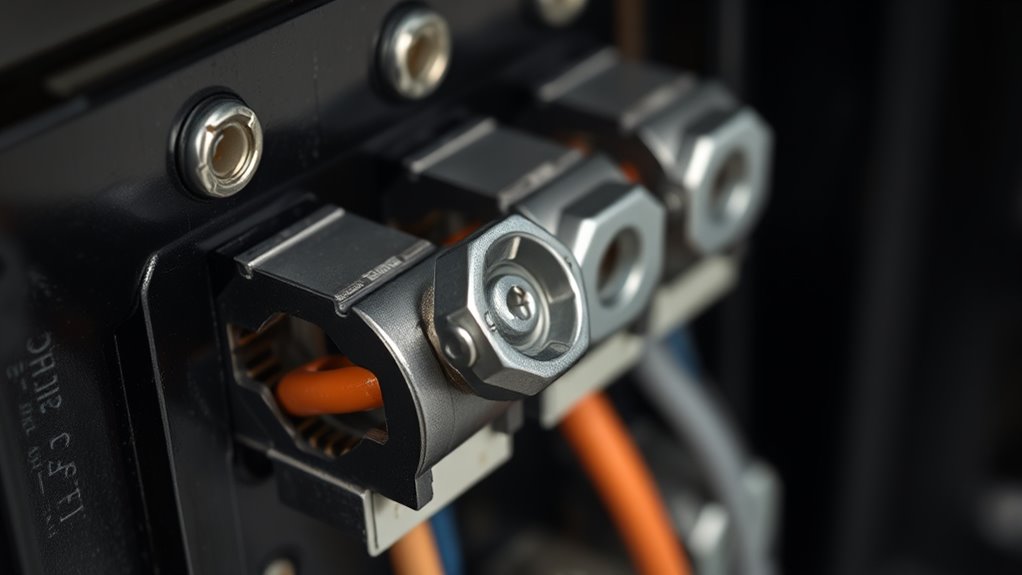
Buzzing sounds in electrical panels often stem from loose or faulty connections. One common cause is voltage fluctuations, which can cause components to vibrate and produce a humming noise. These fluctuations may result from inconsistent power supply or overloaded circuits, stressing the system. Breaker malfunctions also contribute to buzzing, especially if a breaker is malfunctioning or worn out. When breakers don’t fully engage or trip improperly, they create electrical arcing, leading to a buzzing sound. Additionally, loose or corroded connections within the panel can cause intermittent contact, resulting in vibrations and noise. Recognizing these issues early helps prevent further damage, electrical hazards, or potential fire risks. Regular inspections and professional maintenance are essential to identify and address these common causes promptly.
When a Buzzing Might Signal a Loose Connection

If you hear a buzzing in your electrical panel, it’s vital to identify where the sound is coming from. Ignoring it can lead to serious risks like electrical fires or equipment damage. Regular maintenance and prompt attention can help prevent problems before they escalate. Being aware of electrical panel issues can also help you recognize signs of underlying problems early on. Sometimes, a buzzing sound may be related to electrical safety concerns, which require immediate professional inspection. Additionally, understanding home electrical systems can empower you to take appropriate actions when issues arise. Monitoring panel performance over time can aid in early detection of potential faults before they become hazardous.
Identifying the Sound Source
When you hear a persistent buzzing sound near your electrical panel, it’s crucial to identify the source quickly, as it could indicate a loose connection. Start by listening carefully to locate where the sound originates. Check if the buzzing is coming from within the panel or from nearby components. Poor grounding issues can cause electrical arcing, leading to buzzing noises, so ensure your grounding wires are secure. Also, consider panel ventilation—if your panel is overheating or poorly ventilated, it might produce a humming or buzzing sound. Use a flashlight to inspect for any loose or discolored wires, especially around lugs. Identifying whether the noise stems from loose connections, grounding problems, or ventilation issues helps determine if further action is needed. Additionally, awareness of AI-powered solutions could assist in diagnosing complex electrical issues more efficiently. Understanding electrical safety precautions is essential to prevent potential hazards when inspecting or working near your electrical panel. Recognizing the signs of electrical faults can help you address issues before they escalate into more serious problems. For instance, some electrical faults can be identified early through visual inspections combined with diagnostic tools to prevent dangerous failures. Furthermore, consulting entertainment and parks safety guidelines might provide additional insight into safe troubleshooting practices.
Risks of Ignoring Buzzing
Ignoring a buzzing sound from your electrical panel can lead to serious safety hazards. A loose connection or faulty component may cause overheating, increasing the risk of electrical fires or equipment damage. If your panel doesn’t meet electrical code compliance, it might not handle the circuit breaker ratings properly, risking overloads and short circuits. Over time, these issues can weaken the integrity of your electrical system, making it unsafe. A loose lug or bad connection can also cause arcing, which is dangerous and can lead to electrical shocks. Don’t dismiss the sound as harmless; addressing buzzing promptly helps guarantee your system operates within safe circuit breaker ratings and adheres to safety standards, preventing costly repairs or accidents down the line. Proper inspection and maintenance are crucial for avoiding hazardous conditions and ensuring your electrical system remains safe and reliable. Regularly inspecting your electrical panel can help identify potential issues early before they escalate into serious problems.
Preventive Maintenance Tips
Regularly inspecting your electrical panel can help catch signs of loose connections before they become serious hazards. Look for persistent buzzing sounds, which may indicate a loose lug or connection risking a ground fault or panel surge. Tighten any loose terminals carefully, and consider installing arc fault circuit interrupters (AFCIs) for added protection. Use the following table to guide your maintenance:
| Action | Benefit |
|---|---|
| Check for loose wires | Prevents potential ground faults |
| Tighten panel connections | Reduces risk of panel surge |
| Schedule professional inspection | Ensures safe operation |
This routine helps maintain a safe panel, avoids damaging surges, and minimizes electrical hazards. Always turn off power before inspecting or tightening connections. Being aware of family dynamics and how they influence household routines can also contribute to safer electrical practices. Additionally, routine panel inspections can identify early signs of wear or damage that may not be immediately obvious. Regular maintenance can also help prevent electrical fires caused by faulty connections or wiring issues. Incorporating a preventive approach to electrical safety ensures long-term household protection. Furthermore, understanding the importance of proper connection tightening can significantly reduce the risk of electrical faults.
Differentiating Between Normal and Abnormal Panel Noises

Understanding the difference between normal and abnormal panel noises is essential for maintaining electrical safety. Normal sounds, like gentle hums, often come from grounding issues or normal operation, but loud, persistent noises may signal overloaded circuits or loose connections. To identify abnormal noises, listen carefully for irregular buzzing, crackling, or rhythmic tapping. These could indicate loose lugs or other issues that need immediate attention. Keep an eye out for:
- Sudden increases in noise intensity
- Unusual vibrations accompanying the sound
- Consistent humming that worsens over time
- Changes in the sound during heavy load operation
Being familiar with electrical panel sounds can help you detect potential hazards early. If you notice these signs, avoid tampering and consult a professional. Differentiating these sounds helps prevent risks associated with faulty grounding or overloaded circuits, which can lead to dangerous electrical failures, ensuring your panel’s safety. Regular inspections and understanding circuit overload signs can further enhance electrical safety awareness. Recognizing patterns of behavior in noise can also aid in diagnosing underlying problems before they escalate.
Signs of a Potentially Dangerous Loose Lug

A persistent or irregular buzzing sound that worsens over time can be a strong indicator of a loose lug in your electrical panel. This buzzing safety concern often signals poor connection or vibration, which can lead to overheating or arcing if left unaddressed. You should pay close attention to any unusual noises, especially if they increase in intensity or frequency. Signs of a potentially dangerous loose lug include visible signs of wear, scorch marks, or a burning smell near the panel. Regular panel maintenance helps catch these issues early, preventing more serious problems down the line. Understanding electrical safety risks is crucial, as a buzzing panel isn’t just noise—it’s a warning that your electrical system may be compromised and needs immediate inspection by a qualified electrician.
The Risks Associated With Ignoring a Buzzing Panel

Ignoring a buzzing panel can lead to serious safety hazards, as the ongoing vibration and electrical issues increase the risk of fires, shocks, or equipment failure. This noise often indicates grounding issues or loose connections that can worsen over time. If left unaddressed, you risk:
- Circuit overloads causing overheating and potential fires
- Further deterioration of grounding connections, increasing shock danger
- Damage to appliances and sensitive electronics
- Increased likelihood of electrical panel failure
These risks highlight the importance of addressing buzzing immediately. A loose or faulty connection can escalate, compromising your safety and the integrity of your electrical system. Regular inspections and timely repairs are essential to prevent dangerous outcomes and ensure your electrical system functions reliably. Identifying bad connections is crucial for maintaining electrical safety and avoiding costly repairs. Recognizing early warning signs can help prevent minor issues from turning into major hazards. Additionally, understanding electrical system components can aid in diagnosing underlying problems more effectively. Incorporating home security systems can also alert you to electrical malfunctions early, providing an added layer of safety.
How to Safely Inspect Your Electrical Panel
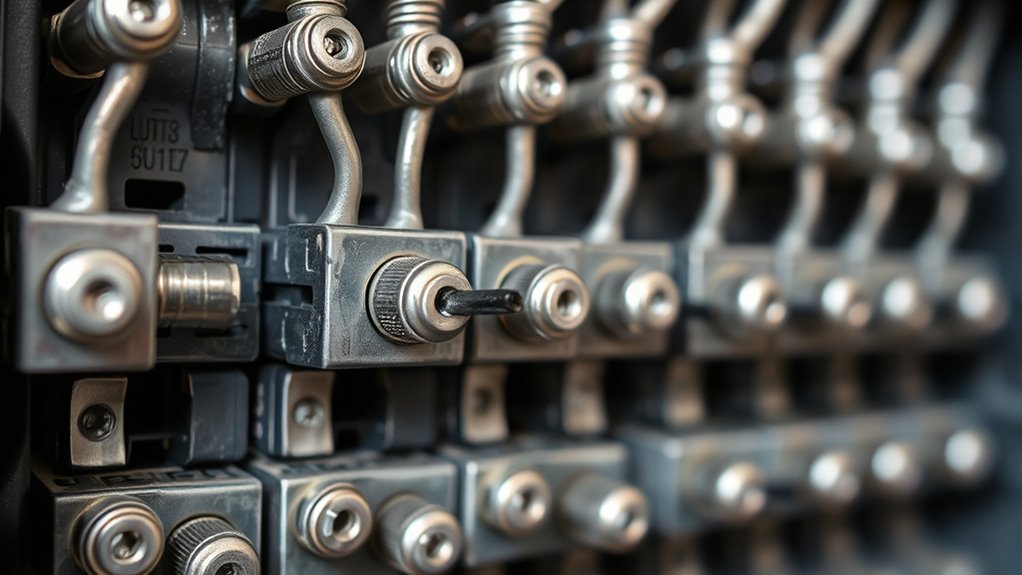
To guarantee your electrical system remains safe and reliable, performing a safe inspection of your electrical panel is a vital step. Start by turning off the main breaker and wearing insulated gloves to avoid accidental shocks. Look for signs of grounding issues, such as corrosion or discoloration around grounding wires and connections. Check that breaker ratings match your system’s specifications; using incorrect ratings can cause overheating or electrical faults. Confirm all breakers are securely snapped in and that no wires are loose or damaged. Do not attempt to touch any internal components while the panel is energized. If you notice any irregularities, consult a licensed electrician. Regular inspections help prevent hazards like buzzing sounds caused by loose lugs or faulty grounding.
Tools and Techniques for Diagnosing Panel Buzzing

When diagnosing panel buzzing, using the right tools is essential to accurately identify the source of the noise. A digital multimeter helps you check circuit breaker functionality and measure voltage levels. A flashlight illuminates hard-to-see areas behind panel labeling, revealing loose wires or components. A stethoscope or mechanic’s probe allows you to pinpoint the buzzing sound without risking shock. Additionally, understanding different circuit breaker types—such as standard, GFCI, or AFCI—guides proper inspection procedures. Careful examination involves listening closely to the buzzing, then verifying connections and tightness accordingly. Remember to always turn off power before inspecting or manipulating components. Proper tools and techniques ensure you can distinguish between harmless hums and potential hazards effectively.
When to Call a Professional Electrician
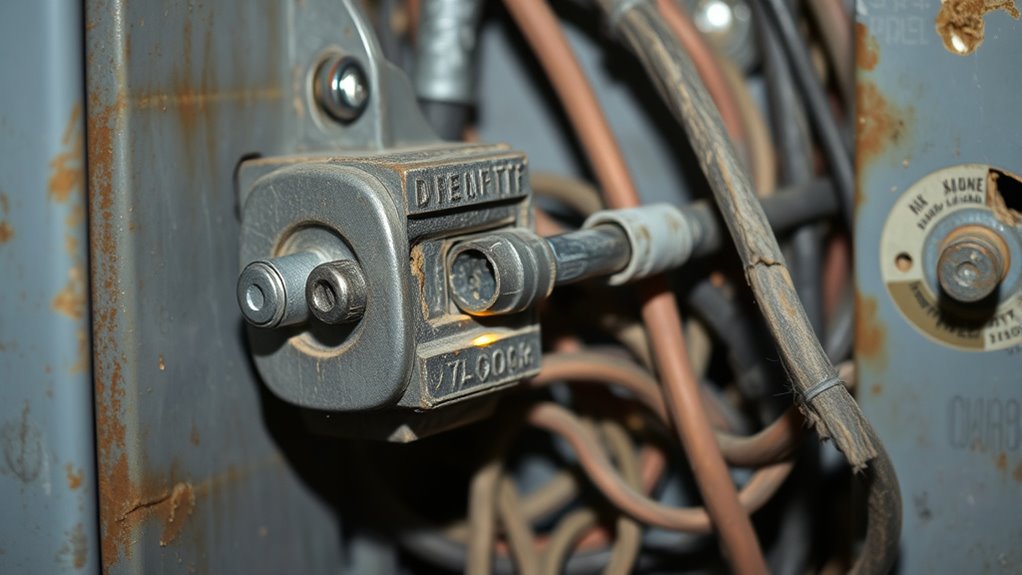
If you notice a persistent buzzing sound, it’s time to call a professional. Visible wiring issues or frequent circuit trips are signs that something’s wrong and could be dangerous. Don’t wait—reach out to an electrician to inspect and fix the problem safely.
Persistent Buzzing Sounds
Persistent buzzing sounds coming from your electrical panel shouldn’t be ignored, especially if they continue over time. Such noises can indicate serious problems like grounding issues or circuit breaker faults that require professional attention. Ignoring these signs might lead to electrical fires or damage to your appliances. When you hear a persistent hum, consider calling an electrician promptly.
You should seek professional help if you notice:
- The buzzing persists even after resetting the breaker
- Flickering or dimming lights nearby
- Burning smell or visible signs of damage
- Loose or discolored wiring near the panel
Addressing these issues early can prevent dangerous electrical failures and ensure your system functions safely and efficiently. Don’t delay—expert intervention is essential for your safety.
Visible Wiring Issues
Visible wiring issues in your electrical panel can pose serious safety risks and often signal underlying problems that require professional attention. If you notice damaged, frayed, or loose wires, don’t delay calling an electrician. Proper wire color coding is essential for safety and troubleshooting; mismatched or faded colors can indicate incorrect wiring or deterioration. Additionally, check if panel labeling is clear and accurate; unlabeled or confusing labels make it difficult to identify circuits, increasing the risk of accidental contact or overload. Never attempt to fix wiring issues yourself, especially if you’re unsure about the wiring standards or the condition of the wires. An experienced electrician can safely assess, correct, and make certain your panel’s wiring adheres to safety codes, preventing potential hazards.
Frequent Circuit Trips
Frequent circuit trips are a clear sign that something’s wrong with your electrical system and shouldn’t be ignored. They often indicate circuit overloads or breaker malfunctions that compromise safety. If your breaker trips repeatedly, it could be because too many devices are running on the same circuit, or a breaker is faulty. Ignoring these signs risks damaging appliances or causing fires. You should call a professional electrician if:
- The breaker trips without an apparent overload
- You notice frequent power outages in specific areas
- Circuit breakers frequently need resetting
- You suspect wiring issues or loose connections
Addressing these problems promptly helps prevent further damage, ensures safety, and keeps your electrical system functioning reliably. Don’t delay professional help when circuit trips become a recurring issue.
Preventive Measures to Avoid Panel Buzzing
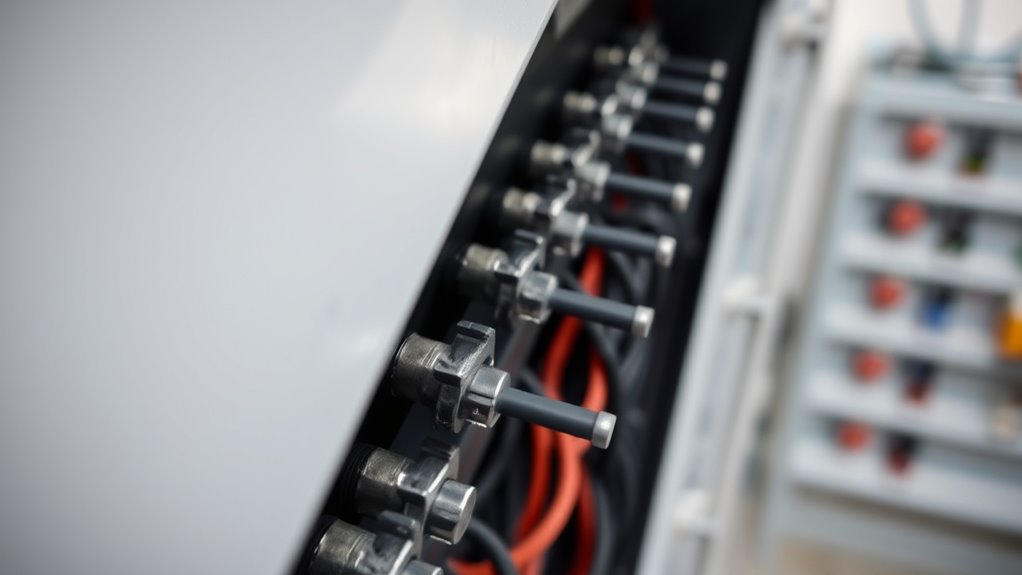
To prevent panel buzzing caused by loose connections, regular inspections and maintenance are essential. Check for grounding issues that can cause vibrations or noise, and ensure all grounding wires are secure and intact. Avoid overloaded circuits, which can create excessive heat and stress on connections, leading to buzzing. Distribute electrical loads evenly across circuits to prevent strain. Tighten any loose lugs or terminals, but do so carefully to avoid overtightening, which can damage components. Keep the panel clean and free of dust, as debris can contribute to poor connections. Schedule professional inspections periodically to identify potential problems early. Addressing grounding issues promptly and managing circuit loads help maintain a quiet, safe electrical panel, reducing the risk of buzzing or more serious electrical faults.
What to Expect During a Professional Electrical Inspection

When you schedule a professional electrical inspection, a qualified electrician will thoroughly examine your electrical panel and system to identify potential issues before they become serious problems. They’ll check for signs of wear, loose connections, and proper circuit breaker maintenance. You can expect them to perform a series of electrical safety procedures, including testing grounding systems and verifying proper insulation. During the inspection, the electrician may:
- Inspect the condition of circuit breakers and lugs
- Tighten loose connections or replace damaged components
- Test for proper voltage and current flow
- Review overall system safety and code compliance
This process ensures your system operates safely and efficiently, reducing the risk of electrical hazards. A professional inspection provides peace of mind, knowing your electrical setup adheres to safety standards and is prepared to handle future demands.
Frequently Asked Questions
Can a Buzzing Panel Cause Electrical Fires?
A buzzing panel can indeed cause electrical fires if left unchecked. The noise may indicate issues like circuit overload or wiring corrosion, which can lead to overheating and sparks. You should inspect the panel promptly, ensuring connections are tight and wiring is in good condition. Ignoring these signs increases fire risk, so it’s best to consult a professional electrician to diagnose and fix the problem safely.
How Often Should I Inspect My Electrical Panel?
Think of your electrical panel as the heartbeat of your home—inspect it regularly to catch trouble early. You should check it at least once a year, especially if you notice circuit overloads or frequent breaker trips. Look for loose connections, scorch marks, or buzzing sounds. Regular inspections help prevent potential hazards, ensuring your home’s electrical system stays safe and reliable, keeping your family protected from unseen dangers.
Are There Signs of Panel Damage I Can See Visually?
You can spot signs of panel damage by looking for visual damage like scorch marks, burn spots, or melted components. Check for corrosion signs around the connections and terminals, which may indicate moisture or rust. Also, inspect for loose or damaged wires, bent or broken parts, and any unusual discoloration. If you notice any of these issues, it’s best to have a qualified electrician evaluate your panel promptly to guarantee safety.
What Are the Costs Associated With Professional Panel Inspection?
The costs for professional panel inspection typically range from $100 to $300, depending on your location and the complexity of your system. Regular inspections, recommended annually or biannually, can help you prevent costly repairs later. Cost estimates vary based on the inspection frequency you choose, but investing in routine checks guarantees your panel’s safety and helps catch issues like loose lugs or buzzing early before they become dangerous.
How Long Does a Typical Electrical Panel Inspection Take?
A typical electrical panel inspection takes about 1 to 2 hours, depending on its complexity. You’ll want to check the circuit breaker and wiring thoroughly—think of it as both a safety check and a peace of mind. While it might seem quick, this inspection is vital to catch loose lugs or faulty wiring that could cause buzzing noises or worse, electrical fires. So, don’t rush; it’s worth every minute.
Conclusion
Remember, your electrical panel is the heartbeat of your home—ignoring a buzzing sound is like ignoring a warning siren in a storm. Stay vigilant, listen closely, and don’t hesitate to call in a professional if something feels off. By catching small sparks early, you keep your home safe and your peace of mind intact. After all, a quiet, humming panel is the symphony of safety, not a forewarning of disaster waiting to strike.
